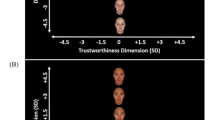Abstract
Since its publication in 1986, Ekman and Friesen's (1986) discovery of a universal facial expression unique to contempt has received considerable attention (e.g., see Ekman & Friesen, 1988; Ekman & Heider, 1988; Ekman, O'Sullivan, & Matsumoto, 1991a, 1991b; Izard & Haynes, 1988; Russell, 1991a, 1991b; Ricci Bitti, Brighetti, Garotti, Boggi-Cavallo, 1989). Actually, much of this argument began before there was adequate sampling of contempt photographs across many cultures. In order to address this concern, this study reports judgment data on all 12 photos used in previous studies depicting the contempt expression from four non-American cultures. The data provide a strong replication of Ekman and Friesen's (1986) and Ekman and Heider's (1988) findings for a universal expression of contempt.
Similar content being viewed by others
References
Ekman, P. (1982).Emotion in the human face. Cambridge, England: Cambridge University Press.
Ekman, P., & Friesen, W. V. (1978).Manual for the facial action coding system. Palo Alto: Consulting Psychologists Press.
Ekman, P., & Friesen, W. V. (1986). A new pancultural facial expression of emotion.Motivation and Emotion, 10 159–168.
Ekman, P., Friesen, W. V., O'Sullivan, M., Chan, A., Diacoyanni-Tarlatzia, I., Heider, K., Krause, R., LeCompte, W., Pitcairn, T., Ricci-Bitti, P., Scherer, K., Tomita, M., & Tzavaras, A. (1987). Universals and cultural differences in the judgments of facial expressions of emotion.Journal of Personality and Social Psychology, 53 712–717.
Ekman, P., & Friesen, W. V. (1988). who knows what about contempt: A reply to Izard and Haynes.Motivation and Emotion, 12 17–22.
Ekman, P., & Heider, K. G. (1988). The universality of a contempt expression: A replication.Motivation and Emotion, 12 303–308.
Ekman, P., O'Sullivan, M., & Matsumoto, D. (1991a). Confusions about context in the judgment of facial expression: A reply to “Contempt and the relativity thesis.”Motivation and Emotion, 15 169–176.
Ekman, P., O'Sullivan, M., & Matsumoto, D. (1991b). Contradictions in the study of contempt: What's it all about?Motivation and Emotion, 15 293–296.
Izard, C. E., & Haynes, O. M. (1988). On the form and universality of the contempt expression: A challenge to Ekman and Friesen's claim of discovery.Motivation and Emotion, 12 1–16.
Matsumoto, D., & Ekman, P. (1988).Japanese and Caucasian facial expressions of emotion (JACFEE). Slides available from David Matsumoto, Department of Psychology, San Francisco State University, 1600 Holloway Avenue, San Francisco, CA 94132.
Ricci Bitti, P. E., Brighetti, G., Garotti, P. L., & Boggi-Cavallo, P. (1989). Is contempt expressed by pancultural facial movements? In J. P. Forgas & J. M. Innes (Eds.),Recent Advances in Social Psychology: An International Perspective (pp. 329–339). Amsterdam: Elsevier.
Russell, J. A. (1991a). The contempt expression and the relativity thesis.Motivation and Emotion, 15 149–168.
Russell, J. A. (1991b). Negative results on a reported facial expression of contempt.Motivation and Emotion, 15 285–292.
Author information
Authors and Affiliations
Additional information
The research reported in this article was supported in part by a grant from the National Institute of Mental Health (MH 42749-01), and by a Faculty Award for Creativity, Scholarship, and Research from San Francisco State University. I would like to thank Veronica Ton for her aid in the collection of the Vietnamese data; Valerie Hearn for her aid in the collection of the Polish and Hungarian data; Masami Kobayashi, Fazilet Kasri, Deborah Krupp, Bill Roberts, and Michelle Weissman for their aid in my research program on emotion; and William Irwin for his aid in the data analysis.
Rights and permissions
About this article
Cite this article
Matsumoto, D. More evidence for the universality of a contempt expression. Motiv Emot 16, 363–368 (1992). https://doi.org/10.1007/BF00992972
Issue Date:
DOI: https://doi.org/10.1007/BF00992972




